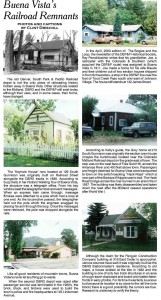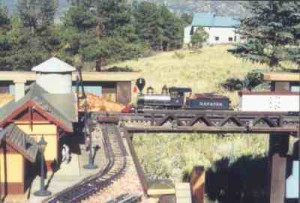Article by Ellen Miller
Politics – January 2004 – Colorado Central Magazine
FOR THE FIRST TIME IN A DECADE, the 3rd Congressional District is a truly competitive open seat, and candidates for both parties are lining up.
The dust has settled somewhat in the fight over redistricting — although state Representative Carl Miller, D-Leadville, was attempting at deadline to fight the state Supreme Court ruling. He wants Lake and Chaffee counties in the 3rd, rather than the 5th, which makes sense from a commonality of interest standpoint.
As of press time, candidates for the United States Congress from the Third District were:
Republicans: state Representatives Matt Smith of Grand Junction and Gregg Rippy of Glenwood Springs; state Senator Ken Chlouber of Leadville; embattled Department of Natural Resources chief Greg Walcher of Palisade; and political newcomers Doug Sitter and Delena DiSanto, both of Durango.
Democrats: state Representative John Salazar and twice-beaten Anthony Martinez of the San Luis Valley; and possibly Grand Junction Mayor Jim Spehar, who said on deadline that he was “99.9% decided” to run.
The GOP looks to be more lively and entertaining, for a change. The Democrats, also for a change, have worked out a strong frontrunner in Salazar, brother of Attorney General Ken Salazar.
Pueblo Democrat Bill Thiebaut, a former state senator and candidate for lieutenant governor, opted out of running, thereby setting up a strong Democratic base in Pueblo for Salazar’s efforts.
Martinez was soundly beaten in two runs for Colorado secretary of state and is a longshot. Spehar, coming from a “base” of Mesa County Democrats who could almost meet in a telephone booth, has an uphill battle against the strong Democratic voting bloc of the San Luis Valley, of which Salazar is a native son.
The Republicans are a different story. Division of Wildlife director Russ George of Rifle opted out, as did state Senator Ron Teck of Grand Junction, both of whom would have attracted strong support.
So the serious players as of this writing are Smith, who is the brother-in-law of outgoing Representative Scott McInnis, Rippy, Walcher, and Chlouber.
The district, according to state Democrat Chairman Chris Gates, is one of only a few (perhaps four) in the nation that is both competitive and open this year.
Thus general election money shouldn’t be a problem for either party’s nominee — both national parties will spend freely on this race. But raising enough for a primary will be critical for candidates, who will be essentially on their own until then.
Each Republican has things to brag about and things he’d rather didn’t come up.
Smith has a reputation as a solid, low-key legislator. An environmental and natural resources attorney by trade, he’s well-versed in water, land use and natural resources.
But there’s a split in the Mesa County Republican Party, pitting conservative cut-taxes-at-all-costs, home -school, anti-abortion activists against the traditional, moderate business Republicans.
The conservative activists took over the party, and although their favored legislative candidate was beaten by state Representative Gayle Berry, R-Grand Junction, they control the party offices and majority of its precinct captains.
Smith says he’s not picking sides, but his campaign announcement was heavy on the conservative side with just a handful of moderates in sight.
Rippy, whose family is well-known in the Roaring Fork Valley, is a contractor by trade and is drawing fire for a bill he successfully backed last year to drastically decrease contractor liability for faulty construction.
He’s gotten good marks from small business operators, takes care of the highways, and constituents liked him enough to re-elect him to the state legislature. He is attracting backing from a variety of heavyweight Republican contributors.
Rippy, although he campaigned against Referendum A, has some explaining to do about his vote in the House Agriculture Committee that sent Referendum A to the floor. Had he voted no, it would have died right there.
WALCHER HAS AN EXTENSIVE Rolodex built through his years working for former Senator Bill Armstrong and his 10-year presidency of Club 20, the Western Slope’s lobbying and promotional organization.
But his support for Referendum A, which didn’t win a county anywhere in the state and was vigorously opposed by Smith, Salazar, Club 20 and hordes of others, won’t be much help in his current campaign.
Then there’s the controversy over a contract he signed with a Utah company to find savings in the Department of Natural Resources; the resultant recommendations are under fire by the Joint Budget Committee. One of the company’s suggestions was hiking, hunting, fishing and parks fees (which they called ”savings”); this was killed by Walcher himself after things hit the fan.
Chlouber has a lot of work ahead of him. While he’s well-known as colorful, his hometown of Leadville isn’t in the Third District according to the recent state Supreme Court decision.
He’s talking about quitting his state senate seat and moving into the district. However, a move didn’t help him when he tried a similar tactic against Representative Dianna DeGette, the Denver Democrat who trashed him in the last election. Chlouber also has the same Referendum A problem Walcher does.
On the Democratic side, Salazar has only been in the Legislature one term, but as an active farmer and member of water boards has more experience in the public policy arena than most one-term legislators do.
If he can capitalize on his San Luis Valley base, do the same in Pueblo and rely on his anti-Referendum A campaigning to get footholds in the isolated pockets of Western Slope Democrats, he’ll be tough to beat in a primary.
The general election is anybody’s bet and it’s far too early to pick a horse. But there could be an election before November of 2004 — a special election to fill the seat, since McInnis has said he might step down early if the right job came along.
In late November, McInnis said he might apply for the Mesa State presidency, which the college’s board of trustees would like to fill by April 1. With his longtime buddy Tim Foster in place as director of the Colorado Commission on Higher Education, and close Foster ally Lena Elliott chairing the Mesa State board, the job may be McInnis’s if he wants it.
If McInnis quits more than 90 days ahead of next November’s election, a special election would have to be held to fill the remainder of this term, since the U.S. Constitution requires that representatives be elected by the people.
The last time the seat was open was 1992, when McInnis beat Democrat Mike Callihan. A highlight of that campaign came when Callihan’s wife, Deborah, was busted for stealing McInnis yard signs in Gunnison — in broad daylight.
The previous donnybrook was 1984, when Republican Mike Strang and Democrat W. Mitchell both survived primaries and ran against each other. Strang won, only to be dumped two years later for Ben Nighthorse Campbell, back when Campbell was a Democrat.
Ellen Miller freelances from Grand Junction, where she was once the AP correspondent.



